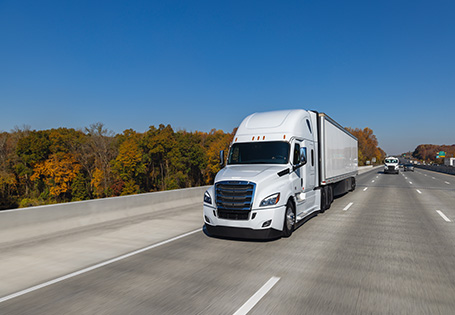Financial Planning 101 for Owner Operators: Budgeting and Managing Expenses
Published on
3 September 2024
Your Center for 37663
Searching for centers...
No centers found in this area. Please try a different location.

3 September 2024
A smooth operation extends beyond how your semi truck performs on the road. Having a strong financial plan is critical to ensuring your business runs smoothly, too. Trucking owner-operators already know a good budget is key. So, let's talk about what it means to manage expenses wisely and employ other financial planning practices.
Understanding the difference between gross and net income is the foundation for financial management as an owner-operator.
Gross income = total earnings before any deductions.
Net income = what remains after all expenses (fuel, maintenance, insurance, etc.) are subtracted.
You might have other income sources beyond just freight rates. These include fuel surcharges, which cover fluctuations in fuel prices, accessorial charges for additional services, drop and hook fees for trailer operations, and detention fees for delays. This all contributes to your gross income and can impact your overall profitability.
Maintaining detailed financial records of all expenditures will save time in the long run and be more accurate. Meticulous tracking not only provides insights into spending patterns but also helps identify areas where you can cut costs. By categorizing expenses into fixed and variable costs, you can manage your finances more efficiently and plan for the future.
Fixed Costs: Expenses that remain constant regardless of your business activity. Examples include loan payments, insurance premiums, and lease agreements.
Variable Costs: Fluctuate with your business operations. These can include fuel, maintenance, and repairs.
Categorizing and tracking costs not only aids in managing current finances but also contributes to the long-term sustainability of your business, ensuring you’re prepared for financial fluctuations and able to make informed decisions.
We talked about how an effective budget is essential for financial stability. Start by calculating your gross income (all sources such as freight charges, fuel surcharges, and any additional fees). Once you have a clear picture of your gross income, list all your expenses to understand where your money is going.
To estimate variable costs like fuel, maintenance, and repairs accurately, use historical data from previous months and industry averages as benchmarks. For example, if your fuel expenses have averaged $2,000 per month over the past year, and you anticipate similar driving patterns, this figure can serve as a reliable estimate for your budget. Regularly reviewing and updating these estimates ensures your budget remains accurate and reflective of your actual spending.
Set both short- and long-term financial goals to guide your spending decisions. Short-term goals might include setting sales targets, saving for an upcoming maintenance expense, or setting aside funds for a new piece of equipment. Long-term goals could involve planning for retirement or expanding your fleet. By aligning your budget with these goals, you can prioritize your spending and avoid unnecessary expenses.
Reducing expenses and boosting operational efficiency are crucial for maintaining profitability as an owner-operator. Here are some effective strategies to consider:
Bulk Purchasing: Buy essential items like fuel, tires, and maintenance supplies in bulk to take advantage of discounts and lower unit costs.
Renegotiating Contracts: Review and renegotiate contracts with suppliers, insurance providers, and other service providers to secure better terms and reduce expenses.
Reducing Unnecessary Expenditures: Identify and cut non-essential spending, such as subscriptions or services that do not directly contribute to your operations.
Improving Fuel Efficiency: Implement practices such as proper tire inflation, smooth driving techniques, and regular vehicle maintenance to enhance fuel efficiency and lower fuel costs.
Performing Regular Maintenance: Schedule routine maintenance checks to prevent costly repairs and ensure your vehicle operates at peak performance.
Leveraging Technology: Use apps or software for real-time financial monitoring and expense tracking to gain insights into spending patterns and make informed financial decisions.
Evaluating and adjusting your insurance coverage is essential for achieving cost savings while ensuring adequate protection. Here’s how to effectively manage your insurance to lower costs and enhance coverage:
Compare Quotes: Regularly compare quotes from various insurance providers to find the best rates and coverage options tailored to your specific needs.
Adjust Coverage Levels and Deductibles: Review and adjust your coverage levels and deductibles to match your operational requirements.
Maintain a Clean Driving Record: A clean driving record demonstrates lower risk to insurers, which can lead to reduced insurance premiums.
Seek Discounts: Get discounts for bundling multiple policies (e.g., vehicle and liability insurance), completing defensive driving courses, or having safety features installed in your vehicle.
Regularly Review Your Policy: Update your policy as needed to reflect changes in your business, such as fleet size or operational scope, and take advantage of any new discounts or better coverage options.
Preparing for unexpected financial challenges, such as equipment breakdowns, legal fees, or regulatory fines, is a big part of maintaining financial stability. Establishing a dedicated savings fund for unforeseen expenses ensures you are well-equipped to handle emergencies without disrupting your business operations. To set up this fund, set some specific savings goals based on potential costs you might face. Determine a consistent amount to save regularly, such as a percentage of your monthly income, and consider using a high-yield savings account to maximize interest and accessibility.
These practices ensure that you’re more prepared for unforeseen expenses that may arise. This way you can focus on growing your business rather than worrying about financial setbacks.
At SelecTrucks, we recognize that effective financial planning is crucial for owner-operators, as it establishes the foundation for increased profitability and long-term business sustainability. By understanding income sources, diligently tracking expenses, and creating a realistic budget, you can identify cost-saving opportunities and make informed decisions that directly impact your bottom line.
Explore our extensive inventory of used semi trucks to find the perfect fit for your needs. For expert support and services to keep your trucks in peak condition, contact your nearest SelecTrucks center.
Our trusted team of truck advisors are here to help you reach your goals by providing exceptional used truck solutions with unwavering support. That means knowledge of your truck as well as business tips, financing and more.







